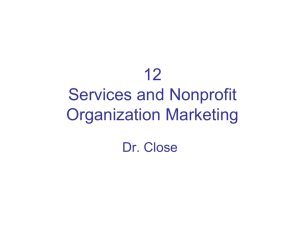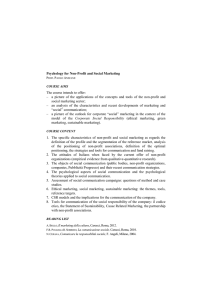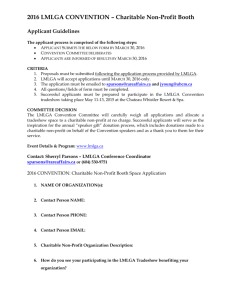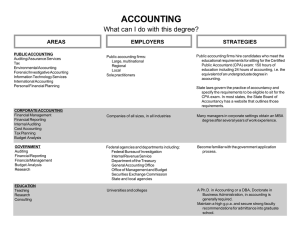The Heritage Foundation - Leadership for America
advertisement
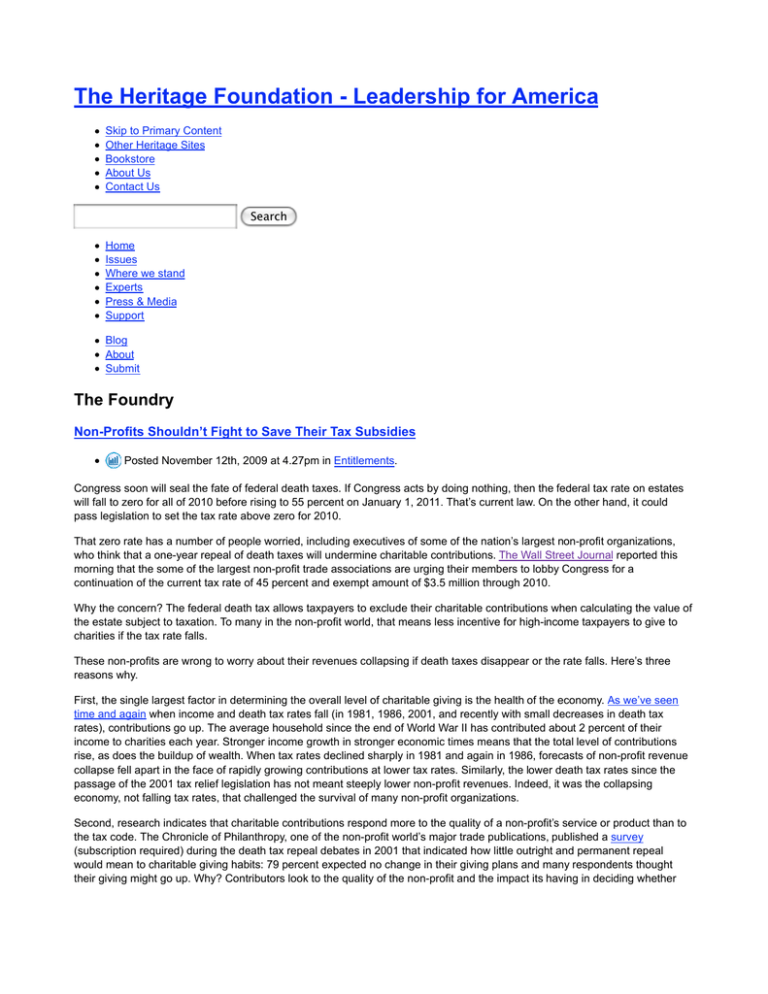
The Heritage Foundation - Leadership for America Skip to Primary Content Other Heritage Sites Bookstore About Us Contact Us Search Home Issues Where we stand Experts Press & Media Support Blog About Submit The Foundry Non-Profits Shouldn’t Fight to Save Their Tax Subsidies Posted November 12th, 2009 at 4.27pm in Entitlements. Congress soon will seal the fate of federal death taxes. If Congress acts by doing nothing, then the federal tax rate on estates will fall to zero for all of 2010 before rising to 55 percent on January 1, 2011. That’s current law. On the other hand, it could pass legislation to set the tax rate above zero for 2010. That zero rate has a number of people worried, including executives of some of the nation’s largest non-profit organizations, who think that a one-year repeal of death taxes will undermine charitable contributions. The Wall Street Journal reported this morning that the some of the largest non-profit trade associations are urging their members to lobby Congress for a continuation of the current tax rate of 45 percent and exempt amount of $3.5 million through 2010. Why the concern? The federal death tax allows taxpayers to exclude their charitable contributions when calculating the value of the estate subject to taxation. To many in the non-profit world, that means less incentive for high-income taxpayers to give to charities if the tax rate falls. These non-profits are wrong to worry about their revenues collapsing if death taxes disappear or the rate falls. Here’s three reasons why. First, the single largest factor in determining the overall level of charitable giving is the health of the economy. As we’ve seen time and again when income and death tax rates fall (in 1981, 1986, 2001, and recently with small decreases in death tax rates), contributions go up. The average household since the end of World War II has contributed about 2 percent of their income to charities each year. Stronger income growth in stronger economic times means that the total level of contributions rise, as does the buildup of wealth. When tax rates declined sharply in 1981 and again in 1986, forecasts of non-profit revenue collapse fell apart in the face of rapidly growing contributions at lower tax rates. Similarly, the lower death tax rates since the passage of the 2001 tax relief legislation has not meant steeply lower non-profit revenues. Indeed, it was the collapsing economy, not falling tax rates, that challenged the survival of many non-profit organizations. Second, research indicates that charitable contributions respond more to the quality of a non-profit’s service or product than to the tax code. The Chronicle of Philanthropy, one of the non-profit world’s major trade publications, published a survey (subscription required) during the death tax repeal debates in 2001 that indicated how little outright and permanent repeal would mean to charitable giving habits: 79 percent expected no change in their giving plans and many respondents thought their giving might go up. Why? Contributors look to the quality of the non-profit and the impact its having in deciding whether and how much to give. Third, outright repeal might actually result in higher charitable giving, not lower. Paul G. Schervish, Director of Boston College’s Center on Wealth and Philanthropy, found (again in the Chronicle of Philanthropy) that lower death taxes (and zero is as low as you can go) would increase the savings of high-income individuals. His survey research shows that these individuals would allocate that increase in savings to greater non-profit contributions. The non-profit community should look to its own research and industry experience when advising Congress on the fate of the federal death tax, not to its baseless apprehensions. Repeal or a zero tax rate would boost economic activity, expand incomes, and improve charitable contributions. By lobbying Congress to retain the nearly confiscatory 45 percent tax rate, non-profits are thoughtlessly assuring a future of paltry revenue growth and taxed to death donors. Author: Bill Beach Interact: Sphere Share This Tagged with death tax non-profits philanthropy Leave a comment Name, Location (required) Email (required, will not be published) Comments are subject to approval and moderation. Commenting is a privilege, not a right. Please keep it clean and stay on topic. Personal attacks and obscene language will not be tolerated. Essentially, don’t say anything you wouldn’t say to your mother at the dinner table. SUBMIT Sign up for Morning Bell Email First Name Last Name Email SUBMIT Heritage Initiatives American Leadership (696) Education (160) Energy and Environment (918) Enterprise and Free Markets (723) Entitlements (143) Family and Religion (78) First Principles (138) Health Care (595) Ongoing Priorities (901) Protect America (612) Rule of Law (230) Recent Entries Obamacare Puts One-Fifth of U.S. On Welfare Guest Blogger: Rep. Dave Reichert Says Trade is Best Stimulus START Talks: Russian Demands Undermine Nuclear Balance Washington Post on Obamacare: A $300 Billion Deception Archives Select Month Links Sherk on govt unions at odds w/ taxpayers' interests in Washington Examiner editorial Haislmaier on costs of regs in health bill in Kansas City Star Health Care series Book op-ed on govt takeover language in Health bills in The Washington Times Carafano op-ed on Obama'a Asian tour + US trade policy in Washington Examiner Heritage stats on Obama's welfare spending in Charleston Post-Courier Darling column on Obamacare, abortion language & U.N. in HumanEvents Heritage Poll Error: This account is currently disabled. Recent Comments START Talks: Russian Demands Undermine Nuclear BalanceMichael E. Rail Obama’s Public Option for Gitmo Lynn B. DeSpain Video: Pelosi Says Jail “Very Fair” Punishment For Not Buying Health InsuranceLynn B. DeSpain Recent Visitors You! Join My Community View Reader Community Join this Community (provided by MyBlogLog) Search The Blog Search RSS Feeds Careers Directions Site Map Privacy Policy Copyright All Rights Reserved © 2008, The Heritage Foundation Site by JESS3
